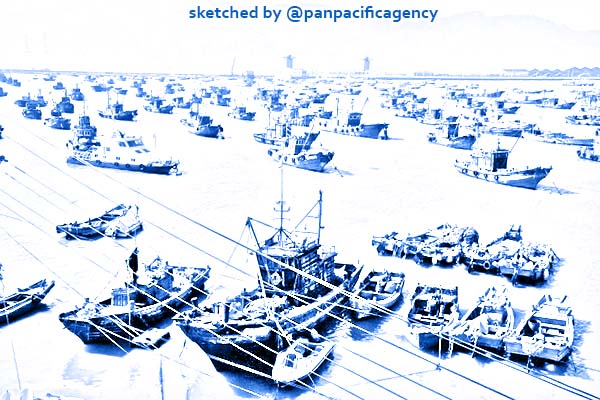Chinese fishing boats break UN sanctions in North Korean waters: Study

Thousands of fishing boats return to harbor to avoid potential damages from Typhoon Tapah in Lianyungang City, east China's Jiangsu Province. [File Photo: IC]. Sketched by the Pan Pacific Agency.
BEIJING, Sep 23, 2020, SCMP. Hundreds of Chinese vessels have been recorded fishing in waters off the coast of North Korea this year in violation of United Nations sanctions and international law, according to new research, South China Morning Post reported.
Jaeyoon Park, senior data scientist with Global Fishing Watch, said on Tuesday that about 800 vessels originating from China were identified fishing in North Korean waters last year.
This year, more than 600 boats had been spotted in the region as of May/June, he said at an online seminar.
“It remains to be seen whether this fishing continues to the end of this year and the end of this season, or whether the Covid-19 pandemic has affected the fishing pattern.”
Other research released in July said that more than 900 vessels of Chinese origin were detected fishing in North Korean waters in 2017 and over 700 in 2018.
The UN imposed sanctions in 2017 against North Korea for its ballistic missile tests, including a ban on the sale of its seafood and fishing rights.
Despite the restrictions, the South Korean coastguard observed hundreds of Chinese vessels crossing into North Korean waters, Park said.
“Transparency is really the top priority for any country, including China, to ensure that fisheries are managed sustainably or transparently,” he said.
“So open up and share data and information with others publicly so that they demonstrate their complete commitment to transparency and sustainable management of fisheries.”
According to Global Fishing Watch, more than US$23 billion worth of seafood is stolen from the seas every year and more than a third of the world’s major commercial fish species are overfished.
The scale of the “dark fleets”, which do not appear on public monitoring systems, is estimated to be about a third of the size of China’s entire distant water fishing fleet, according to the reports released in July.
Beijing in July announced a three-month ban on catching squid in parts of the Atlantic and Pacific oceans to help populations recover.
It also imposed a three-month fishing moratorium in the eastern Pacific from September, after Ecuador voiced concerns about the possible environmental impact of a vast Chinese fishing fleet operating near the ecologically sensitive Galapagos Islands in August.
Zhang Xianliang, head of the fishery department at China’s agriculture ministry, said in July after the release of the “dark fleets” report that Beijing was ready to cooperate with coastal nations and international organisations to establish recommendations and measures on high seas fishery protection.
China has revised its fishing laws – including introducing a requirement for all vessels to install an automatic identification system – and tightened their enforcement in recent years to be more in line with global standards.
In 2017, Beijing revoked the licences of six fishing companies and 10 captains engaged in illegal fishing overseas. In March this year, it said more names would be added to the blacklist.
Sally Yozell, a senior fellow and director of the environmental security programme at the Stimson Centre – a Washington-based think tank – said China had taken steps to improve its legislation on domestic and international fishing but “what they need to do is really to enforce these rules and regulations”.